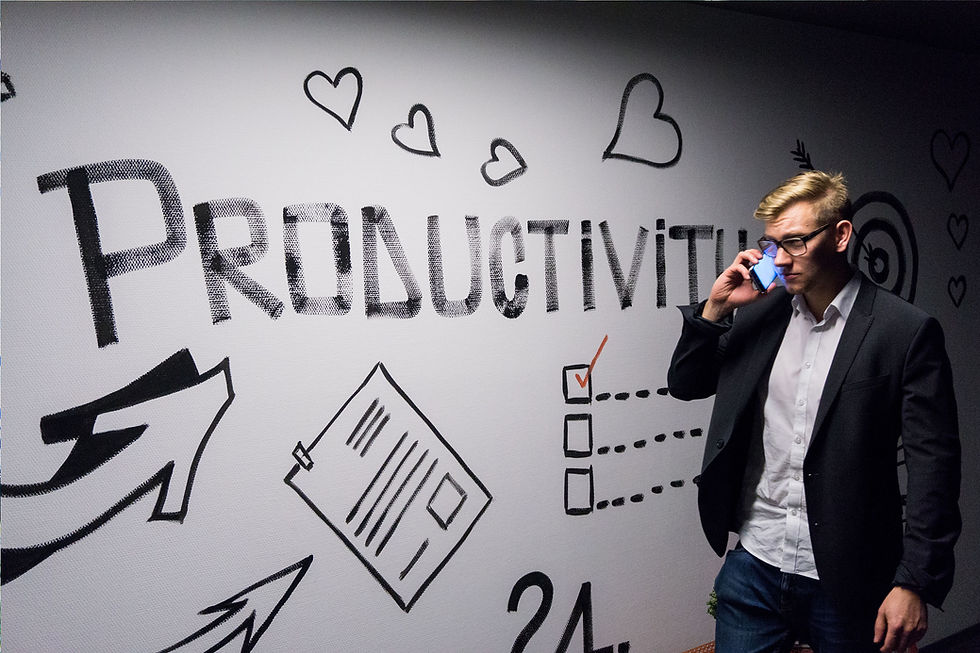Productivity Hacks To Feel More Energized and Organized
- Sarah Sperry

- Feb 7, 2023
- 3 min read
With our hustle culture in full effect, company expectations at an all time high in a tough market environment, and a looming sense of always having to be “connected,” it’s easy to get distracted and lose focus throughout the busy day.

If you find yourself spending most of your day in catch up mode, and fighting fires instead of using your time and brain space in productive ways that actually help you move your career forward, then read on….
1. Write Out Your Top 3 Priorities In the rush of the morning routine– getting kids off to daycare or school – then jumping on work calls all day, it can be difficult to remember all the things on your ever increasing to do list. Fire drills during the day, a last minute call from your boss, or slack message pinging you to pivot all have a tendency to derail us. Writing out 2 or 3 top to do’s of the day keeps you on track and allows you to refocus. Keep this priority list handy so that you can reference it throughout the day. I like to jot them down in the notes app on my phone if I’m on the go, but I still go old school sometimes and write them down in my hard copy calendar or on a post it note by my computer.
2. Own Your Calendar Do meetings suddenly pop up on your calendar out of nowhere or with little notice? Are you constantly reacting and frantically preparing instead of proactively knowing what you need to be ready for? If so, it’s time to start taking back control of your calendar. Assess if every meeting request you receive is a valuable use of your time. Decline politely if it's not.

Start getting in the habit of looking out ahead to the next week (or 2) and pick out 2-3 days a week where you block out time for yourself. This could be a half hour block to just catch your breath, check emails uninterrupted, or actually go to the gym in the middle of the day–this time should be all yours. GUARD IT.
3. Block out time for strategic thinking.
Speaking of block scheduling. Give yourself some creative space where it’s quiet to do your best thinking. Aim to get into your flow state – uninterrupted time spent laser focused on a strategic task– for at least 1-2 hours a week. Julie Jargon, the family and tech reporter for the Wall Street Journal writes, "juggling Zoom, Slack, email and texts may make you feel productive, but in this video she explains research shows otherwise.
Close out of all those tabs you have open, exit out of Slack, shut down email, put your phone on silent, and focus on forward thinking. How will you meet your strategic goals if you are always fighting fires and looking backwards? In the rush of the day, and with our bodies in a constant state of fight or flight waiting for what’s next, it can be hard to shift our brains into higher level thinking mode, but prioritizing this WILL help you land that next promotion, I promise!
4. Take 10 minutes for a brain break Although it seems counter intuitive, allowing your brain to rest throughout the day, even for just a few short minutes, will actually make us more productive and prevent burnout. Neuroscientist Daniel J. Levitin explains in an article written for The Guardian back in 2015 that, “multitasking has been found to increase the production of the stress hormone cortisol as well as the fight-or-flight hormone adrenaline, which can overstimulate your brain and cause mental fog or scrambled thinking." In a nutshell our brains are not meant to multitask as much as our modern world requires, leading to less effective decision making and leadership. I recommend a short breathing exercise, meditation, or taking time to stretch your body away from your desk.
5. Pause before saying Yes. Is it your default to always say yes despite having an already full plate? If so, try pausing before saying yes to anything extra. Assess if it's in your job scope. Recent research from Lean In and McKinsey Company shows that women tend to take on more DEI, ERG work, and administrative related tasks, but yet aren’t being compensated for it, leading to higher rates of burnout. So,“I’ll get back to you,” is a perfectly acceptable answer which can give you more time and space to decide whether you have the capacity to take on more work, and/or what YOU will personally and professionally get out of the additional project.
For people-pleasing personalities, saying no can be difficult. But learning to decline and set better boundaries are important skills to learn as we move up in the ranks. Remember, saying no can feel empowering and provide autonomy if your workload is starting to overwhelm you.
#productivity #productivityhacks #tips #habits #tools #strategies #organized #energized #taskmanagement #worksmarter #corporatewellness #womenintheworkplace #executivecoach #burnout #sperrywellness




Great tips! Thank you, Sarah!